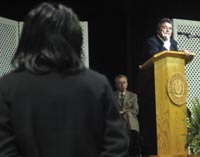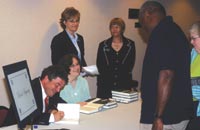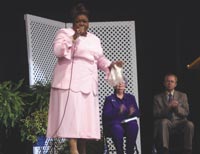College News
Author shares local story at lecture
Notice: This article is older than 12 months. Names, contact information, programs, titles, etc. might have changed. If you have any problems please call the main college number, 1-800-682-8353, and we will be happy to direct you accordingly.

click image to enlarge ⊗
Dr. Timothy B. Tyson listens to an audience member's question after his lecture Wednesday, September ... (more)

click image to enlarge ⊗
Dr. Timothy B. Tyson (far left), the featured speaker at a special CCCC lecture, signs copies of his ... (more)

click image to enlarge ⊗
Gospel singer Mary D. Williams opens the special CCCC lecture event with a medley of songs mentioned ... (more)
09.23.2005 • Arts & Entertainment • Foundation • Special Events
SANFORD — Dr. Timothy B. Tyson, author of “Blood Done Sign My Name,” stressed the importance of remembering the past at a special Central Carolina Community College (CCCC) lecture event Wednesday, September 21, at the Dennis A. Wicker Civic Center.
In “Blood Done Sign My Name,” Tyson recounts the story of a racially-driven murder and the following insurrection he witnessed as a teenager in Oxford, N.C.
Tyson said people frequently ask him why he dredged up this ugly story from the past.
“ We do have to go forward,” Tyson said, but he emphasized the importance of turning to the past for guidance. “Who we are is very much a function of who we have been. If you’re going to heal, you have to have an honest conversation with your own past.”
While Tyson opened the lecture discussing some accounts of racial stand-offs and violence that received national attention, he went on to present the audience with a piece of Sanford’s local history.
“ We look at the civil rights movement as if it were a series of battles like the Civil War,” he said, “but it happened everywhere. It happened in Sanford.”
Tyson lived in Sanford as a youth and his father, the Rev. Vernon Tyson, pastored a number of area local churches.
The elder Tyson was the pastor at Jonesboro United Methodist Church in 1963. The pastor invited Dr. Samuel Proctor, a renowned black preacher who was president at North Carolina A&T State University at the time, to preach at the church on Race Relations Sunday.
Tyson said in between the invite and the special sermon, Sanford had its “own little Birmingham” when more than 50 black teenagers were arrested and charged with trespassing after participating in demonstrations.
He said after that incident (and because of Proctor’s upcoming visit) his father began to receive complaints from church members and threats from opposition in the community.
Tyson recalled that one of the church’s members — a first grade teacher named Ms. Amy Womble — may have saved the church and his father when she spoke up in support of the guest preacher at an emergency meeting of the church’s administrative board.
According to Tyson, she shared the story of a black airman who saved the life of a young white boy in Orange County and it moved the board to vote 25-14 in favor of Proctor’s visit.
Tyson said the church was packed for Proctor’s sermon and the visiting preacher won the congregation over with a powerful sermon, not about race, but regarding the Biblical account of Jacob wrestling with an angel.
“ That was our civil rights story,” Tyson said. “The one we grew up hearing. We felt good about it.”
However, he emphasized that people need to remember the whole Civil Rights history. “America needs to come to grips with its own past,” he said. “History is not always a happy story.” Tyson said for every story with a happy ending, there is another with “buildings burning and bullets flying.”
Tyson also said public education is important to society. He encouraged those in attendance to back CCCC. “Support your community college, because it’s really important,” he said. “A place like this helps people grow and blossom and find their worth.”
Mary D. Williams, who often performs before Tyson gives such lectures, opened the evening with a moving medley of songs mentioned in “Blood Done Sign My Name.”
“ They set the tone for what we’re going to talk about tonight,” the gospel singer told the audience.
Tyson is professor of Afro-American Studies at the University of Wisconsin-Madison, visiting professor of American Christianity and Southern Culture at the Duke Divinity School and senior scholar at the Center for Documentary Studies at Duke University. From 2004 through 2005, he served as the John Hope Franklin senior fellow at the National Humanities Center.
Categories
- Admin, Faculty & Staff Category
- Arts & Entertainment Category
- Clubs Category
- College & Community Category
- College General Category
- Continuing Education Category
- Curriculum Programs Category
- Distance Education Programs Category
- Facilities/Buildings Category
- Finances Category
- Foundation Category
- Graduations Category
- Lee Early College Category
- NCCCS Category
- SGA Category
- Special Events Category
- Sports Category
- Students/Graduates Category
- Uncategorized Category
Archives

